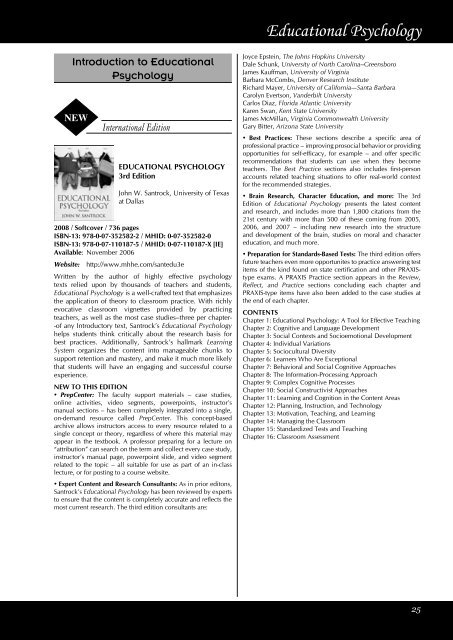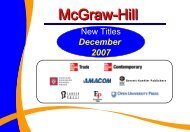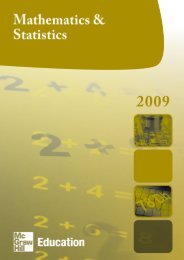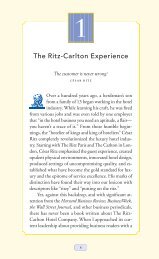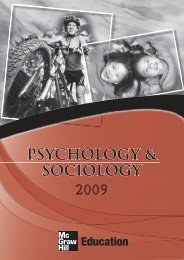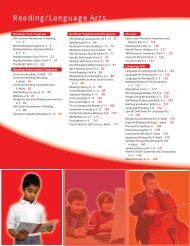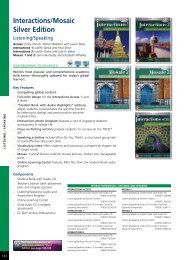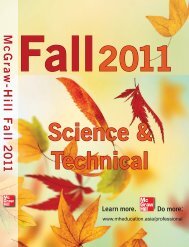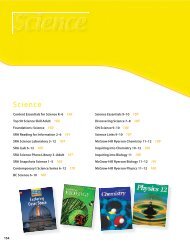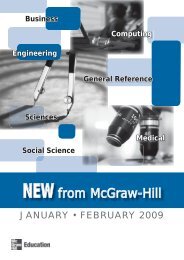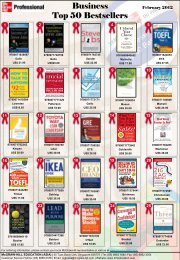table of contents - McGraw-Hill Books
table of contents - McGraw-Hill Books
table of contents - McGraw-Hill Books
You also want an ePaper? Increase the reach of your titles
YUMPU automatically turns print PDFs into web optimized ePapers that Google loves.
Educational Psychology<br />
Introduction to Educational<br />
Psychology<br />
NEW<br />
International Edition<br />
EDUCATIONAL PSYCHOLOGY<br />
3rd Edition<br />
John W. Santrock, University <strong>of</strong> Texas<br />
at Dallas<br />
2008 / S<strong>of</strong>tcover / 736 pages<br />
ISBN-13: 978-0-07-352582-2 / MHID: 0-07-352582-0<br />
ISBN-13: 978-0-07-110187-5 / MHID: 0-07-110187-X [IE]<br />
Available: November 2006<br />
Website: http://www.mhhe.com/santedu3e<br />
Written by the author <strong>of</strong> highly effective psychology<br />
texts relied upon by thousands <strong>of</strong> teachers and students,<br />
Educational Psychology is a well-crafted text that emphasizes<br />
the application <strong>of</strong> theory to classroom practice. With richly<br />
evocative classroom vignettes provided by practicing<br />
teachers, as well as the most case studies--three per chapter-<br />
-<strong>of</strong> any Introductory text, Santrock’s Educational Psychology<br />
helps students think critically about the research basis for<br />
best practices. Additionally, Santrock’s hallmark Learning<br />
System organizes the content into manageable chunks to<br />
support retention and mastery, and make it much more likely<br />
that students will have an engaging and successful course<br />
experience.<br />
NEW TO THIS EDITION<br />
• PrepCenter: The faculty support materials – case studies,<br />
online activities, video segments, powerpoints, instructor’s<br />
manual sections – has been completely integrated into a single,<br />
on-demand resource called PrepCenter. This concept-based<br />
archive allows instructors access to every resource related to a<br />
single concept or theory, regardless <strong>of</strong> where this material may<br />
appear in the textbook. A pr<strong>of</strong>essor preparing for a lecture on<br />
“attribution” can search on the term and collect every case study,<br />
instructor’s manual page, powerpoint slide, and video segment<br />
related to the topic – all sui<strong>table</strong> for use as part <strong>of</strong> an in-class<br />
lecture, or for posting to a course website.<br />
• Expert Content and Research Consultants: As in prior editons,<br />
Santrock’s Educational Psychology has been reviewed by experts<br />
to ensure that the content is completely accurate and reflects the<br />
most current research. The third edition consultants are:<br />
Joyce Epstein, The Johns Hopkins University<br />
Dale Schunk, University <strong>of</strong> North Carolina--Greensboro<br />
James Kauffman, University <strong>of</strong> Virginia<br />
Barbara McCombs, Denver Research Institute<br />
Richard Mayer, University <strong>of</strong> California—Santa Barbara<br />
Carolyn Evertson, Vanderbilt University<br />
Carlos Diaz, Florida Atlantic University<br />
Karen Swan, Kent State University<br />
James McMillan, Virginia Commonwealth University<br />
Gary Bitter, Arizona State University<br />
• Best Practices: These sections describe a specific area <strong>of</strong><br />
pr<strong>of</strong>essional practice – improving prosocial behavior or providing<br />
opportunities for self-efficacy, for example – and <strong>of</strong>fer specific<br />
recommendations that students can use when they become<br />
teachers. The Best Practice sections also includes first-person<br />
accounts related teaching situations to <strong>of</strong>fer real-world context<br />
for the recommended strategies.<br />
• Brain Research, Character Education, and more: The 3rd<br />
Edition <strong>of</strong> Educational Psychology presents the latest content<br />
and research, and includes more than 1,800 citations from the<br />
21st century with more than 500 <strong>of</strong> these coming from 2005,<br />
2006, and 2007 – including new research into the structure<br />
and development <strong>of</strong> the brain, studies on moral and character<br />
education, and much more.<br />
• Preparation for Standards-Based Tests: The third edition <strong>of</strong>fers<br />
future teachers even more opportunites to practice answering test<br />
items <strong>of</strong> the kind found on state certification and other PRAXIStype<br />
exams. A PRAXIS Practice section appears in the Review,<br />
Reflect, and Practice sections concluding each chapter and<br />
PRAXIS-type items have also been added to the case studies at<br />
the end <strong>of</strong> each chapter.<br />
CONTENTS<br />
Chapter 1: Educational Psychology: A Tool for Effective Teaching<br />
Chapter 2: Cognitive and Language Development<br />
Chapter 3: Social Contexts and Socioemotional Development<br />
Chapter 4: Individual Variations<br />
Chapter 5: Sociocultural Diversity<br />
Chapter 6: Learners Who Are Exceptional<br />
Chapter 7: Behavioral and Social Cognitive Approaches<br />
Chapter 8: The Information-Processing Approach<br />
Chapter 9: Complex Cognitive Processes<br />
Chapter 10: Social Constructivist Approaches<br />
Chapter 11: Learning and Cognition in the Content Areas<br />
Chapter 12: Planning, Instruction, and Technology<br />
Chapter 13: Motivation, Teaching, and Learning<br />
Chapter 14: Managing the Classroom<br />
Chapter 15: Standardized Tests and Teaching<br />
Chapter 16: Classroom Assessment<br />
25


